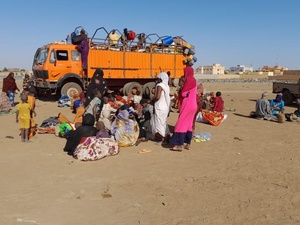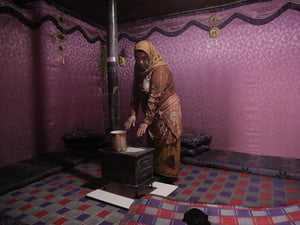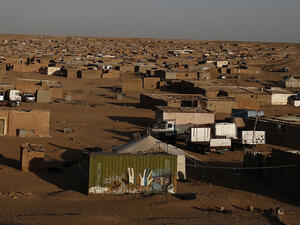Western Saharan refugees await aid in desert camps
Western Saharan refugees await aid in desert camps
Geneva - Two of the UN's leading humanitarian agencies today appealed to donor countries to provide at least US$1.2 million each month mainly for urgently needed food aid for Western Saharan refugees living in remote camps in south-west Algeria.
The UN refugee agency (UNHCR) and the UN World Food Programme (WFP) called on donor countries to maintain adequate levels of aid to the Western Sahara refugees who have spent the last 26 years in windswept exile awaiting a political solution.
About 155,000 Western Saharan refugees benefiting from external assistance have been living in four desolate camps near Tindouf, south-west Algeria since 1976. They have been seriously affected by budget cuts facing the UN refugee agency as well as erratic funding for WFP's food aid operation as parties to the territorial dispute continue to argue over the future of Spain's former territory on Africa's northern Atlantic coast.
"Western Sahara's refugees are in dire need of regular and sufficient aid deliveries," said Athar Sultan-Khan, UNHCR representative in Algiers. "They are completely dependent upon fragile supply lines while interest in their plight and financial support appears to be diminishing."
UNHCR has been forced to reduce its spending for the Western Saharan refugees by more than $660,000 due to a dramatic budget shortfall facing the organization. The cuts mean that many refugees will not receive clothing material and new tents. UNHCR has also deferred the construction of new water wells and the distribution of cooking stoves and fuel.
WFP has similarly experienced severe lapses in contributions for the Western Saharan refugees in Algeria, who will receive this month their ration of cereals (barley and wheat), but no vegetable oil, nor pulses - the latter being an important source of protein for the refugees. The food scarcity facing the refugees is expected to dramatically worsen by September unless cash or in-kind contributions arrive immediately.
"People cannot eat retroactively," said Werner Schleiffer, Director of the WFP Bureau in Geneva. "The WFP operation for the Western Sahara's refugees has been one the worst funded with alarming ups and downs in contribution levels."
Following its appeal in August 2000 for US$ 27.8 million dollars to enable WFP to deliver 64,500 tons of food over a two-year time-span, the agency has been able to distribute so far only 12,000 tons to the refugees since last September. While some 8,900 tons of bilateral food aid donated mostly by the European Commission helped to narrow the gap, overall monthly food rations still reached a deficit of up to 30 percent. Moreover, bilateral pledges have now dried up.
"Thanks to some recent contributions from Netherlands, Sweden and France, we will be able to feed the refugees for the next two months. But without fresh new contributions, our warehouses will be empty again by September," said Werner Schleiffer.
WFP needs 3,000 tons of food per month to feed 155,000 refugees among the most vulnerable. "As the refugees are living in the desert, there is no way they can become self-sufficient", said Schleiffer. "They depend entirely on food aid to survive. Women, children and the elderly are the most seriously affected by this erratic funding."
"Refugees should not be penalized pending a political solution," UNHCR's Sultan-Khan said. "They need regular and sufficient aid supplies, not drops from the bottom of the barrel."









